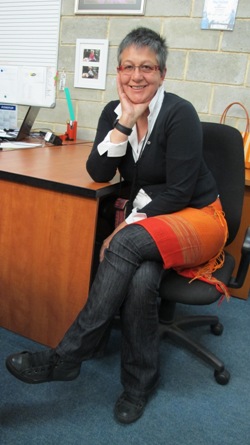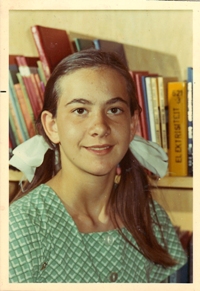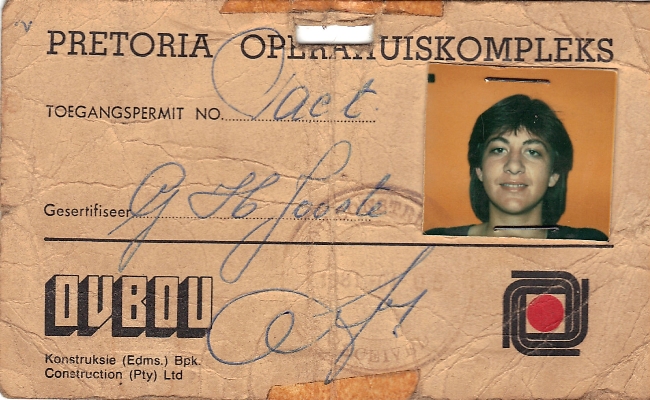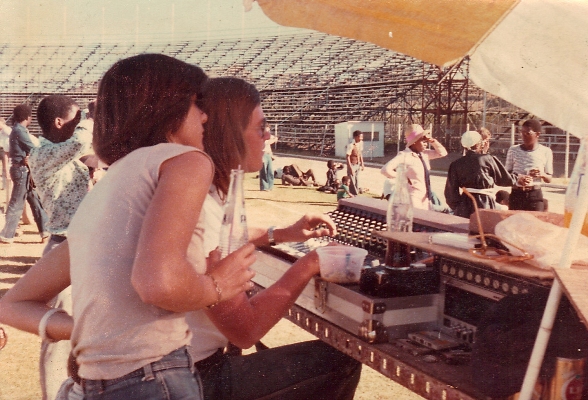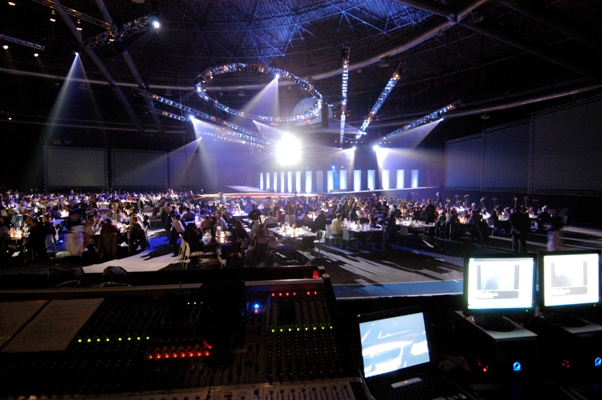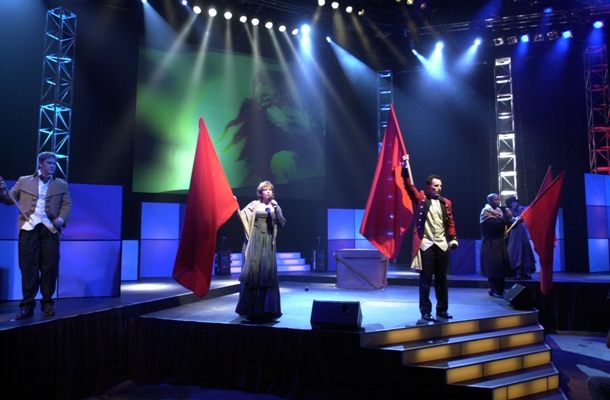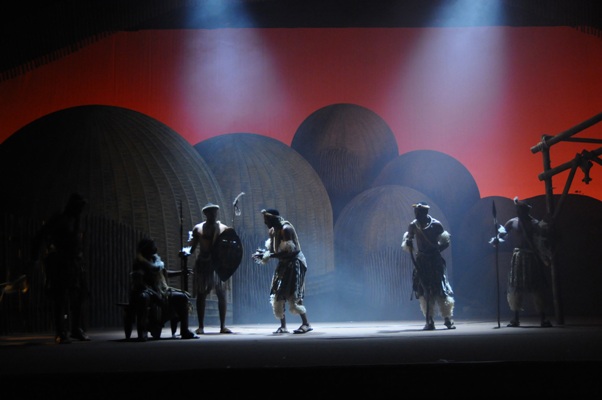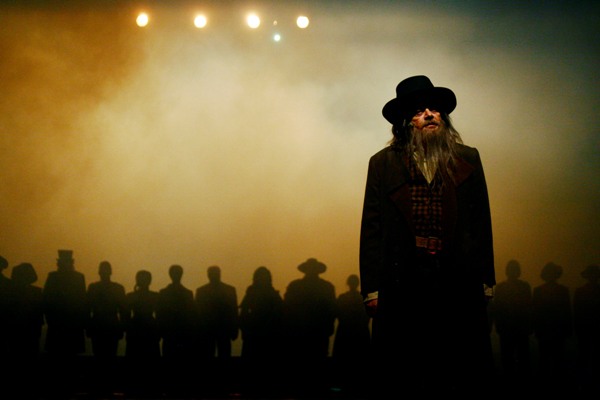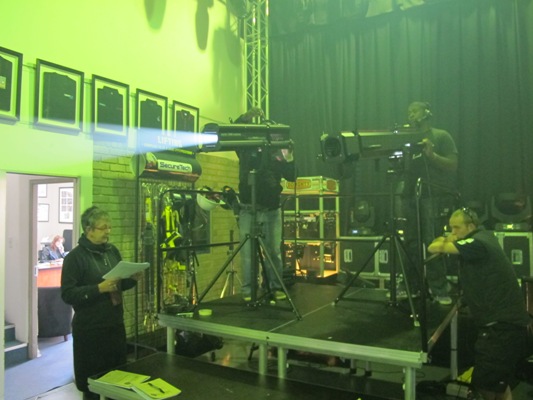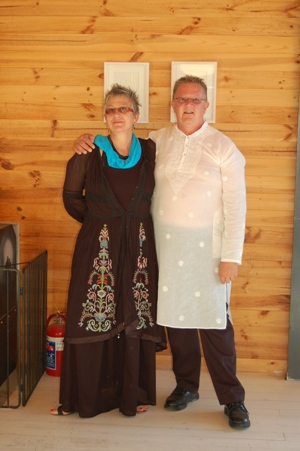If there is a lighting designer in South Africa, someone who has stood the test of time, someone who has influenced lives and who, still is passionate about lighting design, it would be Gerda Kruger.
Gerda has done tremendous work at the Breytenbach Theatre encouraging students and is also presenting training to the industry, but what still makes her heart skip a beat is lighting a show, starting from set-up to watching the show grow. “In fact, I get the blues after opening night,” said Gerda. “And I think to myself, what do I do now?”
In view of technology, Gerda rightly believes that lighting is part of the performance but should never have the lead role or overpower a production. “I move my lights in darkness,” she smiles.
“My work is very theatrical and I believe you should not see a fixture move, it should go into the next cue like magic. I don’t use all the functions of a particular light just because it has them.”Needless to say, she is partial to generics.
Before she fell in love with lighting, Gerda wanted to be an artist and still paints when she can. Her paintings have been exhibited in Pretoria and formed part of an exhibition of South African artists that toured Belgium. “Lighting is basically painting, but with light, which is why I find so much creative pleasure in it,” she said.
Her parents were members of the Krugersdorp Dramatical Society and worked with people like Anna Neethling-Pohl, Andre Huguenot and befriended Dr. PPB Breytenbach, one of the founders of theatre in South Africa and after whom the Breytenbach Theatre is named.
Gerda’s love for theatre was instilled in her by attending productions her father staged at his school in Benoni.
After completing her education at Hoërskool Brandwag, Benoni in 1976, Gerda decided to study Art at the Pretoria Technikon and shortly thereafter discovered they also offered a course in theatre crafts. The following year she swopped to the three year National Diploma in Theatre Crafts course, specializing in Scenic Art, Lighting and Sound and graduated with a diploma at the end of 1980, proudly with a distinction for the subject Lighting and Sound.
As a rule during the last year of the course, a student’s time was expected to be divided between formal theoretical studies at the Technikon and practical on-the-job training at either a theatre or theatrical institution. However, Gerda spent the entire year working at the Aula Theatre in Pretoria and at the Civic Theatre in Johannesburg, mostly under the guidance of Barry Snow and Nic Michaletos who was then Senior Production Manager and Head of Lighting respectively for PACT. Although the students were not usually paid for their practical training, Gerda spent so much time working on productions for Pact that Barry gave her an honorarium of a hundred rand per month for her valuable input. These days, that would enable one to buy two large pizzas!
“When I finished my course at the end of 1980 I went to Europe,” explained Gerda, “but because of Apartheid in South Africa, none of us were allowed to work abroad. I went to England and the theatres said there was no way they would be able to employ me either. I so wanted to work in London at the Covent Garden Theatre. I would have been happy to start as a stage hand…. I always feel you have to earn your dues. Unfortunately that was not permissible.”
The irony, of course, was that Gerda grew up in a liberal home, and for many years had an ANC membership card. In 1990, she considered working in Holland, having Dutch ancestors and could obtain a Dutch passport. “Things started changing in South Africa at that time though, and we decided to stay. I loved what was happening, we were developing as a country.”
Her very first job was at the State Theatre in Pretoria as a Lighting Technician in 1981.
The next eight years saw her working as Lighting Technician, Stage Manager and Lighting Designer for PACT and PACOFS. She was appointed the first Chief Lighting Technician/Designer for the Sand du Plessis Theatre in Bloemfontein in 1984.
During her theatre career she worked with all the main lighting designers in South Africa amongst others, Nic Michaletos, Martin Pelser, Paul Pamboukian, Stan Knight and John T Baker.
After a short stay at the Wild Coast Sun in 1988, Gerda started specialising in lighting corporate events. She joined Productions Projects in 1989 where she broadened her experience in the corporate world, lighting many functions and launches with Nic Michaletos and on her own.
Gerda formed her own lighting design company, The Light ConneXion, in 1994. Since then she has been in demand as a lighting designer for corporate events and has lit some of the leading launches and events in South Africa.
Instead of becoming a lighting company with lots of gear, Gerda wanted to concentrate on what she was good at, her passion – lighting design. Although the norm in Europe and the USA, this was a fairly new concept to South Africa at the time. “Lighting designers take care of the creative side, i.e. the meetings with the director, set and costume designers, deciding on placement of lights, which colours to use and the overall look of the lighting for the production. Lighting supply companies are then contracted to supply and rig the lighting, under supervision of the designer. This way of work allows the designer the freedom to concentrate on the artistic elements of the production.”
With so many productions behind her and such a great life in the arts, it’s difficult for Gerda to select a specific highlight in her career. “Every production is unique and seeing it on stage as I envisaged it, is a highlight every time. In this field you are only as good as your last show, therefore every show has to be my best.”
There were moments that stood out, one of them Delta’s 10th Birthday. “It was a totally theatrical show with no moving lights at all, the whole lighting rig was generic lighting.” Another recollection, while a very small show, was a function for the Nelson Mandela Children’s Fund where Gerda met Madiba. “The man has an awesome presence and I just wanted to hug him!”
The Toyota Condor launch stood out because of the challenges of the open spaces in which it was done. And Gerda still remembers the experience of the Press Launch of the VW Polo at the Tau Game Lodge. “We basically told a story with lighting and sound in the bush. There were no sets or actors, just those elements. It was a challenge to make the lighting a performer instead of having just a ‘Lighting Experience’. Here it was all integrated as one: lighting, sound and the bush. We even used elephant dung to create smoke!”
In terms of sheer size and variety, the Daimler-Chrysler C-Class Launch and Plant Opening was remarkable. “The show itself was in a Tensile 1, back then the largest tent ever to be put up in South Africa. There was an incredible line-up with a variety of artists from mass drumming to dancers, from Africa to space in seconds, and it was a big challenge to light all of this with one lighting rig.”
“Of course the production we did in the Cango Caves will always stand out; the beauty of the caves when lit from different angles and in colour was just awesome.”
With deep affection, Gerda will never forget her first professional lighting design, ‘Die Swerfjare van Poppie Nongena,’ directed by Marius Weyers. “Marius is an incredible person to work with, I could not have asked for a better director for my first design.” During the Apartheid Era black people were evicted from properties that were in areas designated as “white only” and forced to move into segregated townships. Gerda toured with ‘Poppie’ all over South Africa, including the townships. “We had to have escorts to get us in and out,” she remembers. In the years that followed she boycotted all events where her black crew were not invited to. Gerda and her husband Philip, also became active members of the liberal movement.
In July 2008 Gerda was offered the position of Acting Theatre and Production Manager of the Breytenbach Theatre in Pretoria on behalf of the Tshwane University of Technology and in 2009 she took over the position on a permanent basis. Her responsibilities were far reaching and typical of her character. She wasted no time in developing the theatre’s potential as a training facility that allowed students to experience what they could expect when working in a ‘real world’ environment.
Gerda set about renovating and upgrading the facilities of the theatre with the assistance of sponsorships from certain suppliers and also initiated a community project for the local youth aimed at uncovering their potential talent by providing them with the platform of the Breytenbach Theatre’s little ‘Moonbox’ in which to stage their programmes. One of Gerda’s fondest achievements was the restoration of the bronze bust of Dr. Breytenbach, who was affectionately known by all who knew him as ‘Oom Breytie’, to its rightful place in the theatre foyer.
While at the Breytenbach Theatre, Gerda did not neglect her freelance career as Lighting Designer and lit various corporate events as well as musicals for Deon Opperman, “Ons Vir Jou”, “Shaka Zulu”, “Dis Hoe Dit Was – Steve Hofmeyr”, “Jock of the Bushveld” and “Tree Aan!” She recently decided that it was time to return to Lighting Design on a full-time basis and resigned from the Breytenbach Theatre at the end of March 2012. “It is with sadness and regret that I am leaving the students and the Breytie, but it is time to move on and I feel that I can contribute to the industry in other ways,” were her parting words.
If there is anything that bothers Gerda, it’s the misconception that South Africans in this industry are inferior to their international counterparts. “We are as good, if not better, than anyone from overseas,” Gerda maintains. “Every time we have had an overseas designer or production company in our country, they are amazed by our standard of work. We are forced to be more inventive as we do not have the budgets they have and we can do stunning things with much less.”
She has made a point of seeing other shows, especially when in London, to see how things are done over there. “I saw some really stunning lighting, but nothing was in any way better than what I’ve seen in South Africa. They just have a lot more equipment at their disposal to do the same job.
“Lighting is still sometimes seen as the poor cousin when it comes to budgets. A huge amount of money is spent on sets, but when it comes to the lighting we generally get the little bit that’s left. Clients don’t really see the lighting – only what it lights – and often don’t see the real need for it. Good lighting can enhance any production and often save a bad one. We still have a lot of work to do in educating the clients in South Africa.”
Apart from her lighting career, Gerda had also managed to find time to serve on the board, including two terms as Chairperson, of the Wet Nose Animal Rescue Centre, a right to life animal shelter based in Pretoria. “I love animals and through Wet Nose we can make a difference. It is the most amazing feeling when you see an abused dog find a loving home, knowing that you saved its life. There are so many abused and unwanted animals, and without much choice, they often end up being euthanized. Wet Nose takes unwanted animals in, rehabilitates them and finds them homes. Here, no animal gets refused or euthanized because we believe every animal deserves a second chance to find love and a home.”
In the few spare moments she has, Gerda loves making furniture, painting and is contemplating a range of designer animal furniture…tying it all together.
Gerda has worked hard and with passion in the theatre or on the projects dearest to her. “We work through the night with no sleep, the first to set up and the last to strike. I have made the tea, I have been the stage electrician and you literally work your way up. But once you start you can’t leave. I can’t think of doing anything else. If you can make it for the first six months, it’s already in your blood.”
To contact Gerda
E-mail: [email protected]
Visit: www.pkctech.co.za
Twitter @gerdalx
![Gerda Kruger 1 51Z_gerda250a[1]](https://dwrdistribution.co.za/wp-content/uploads/2014/02/51Z_gerda250a12-1.jpg)
